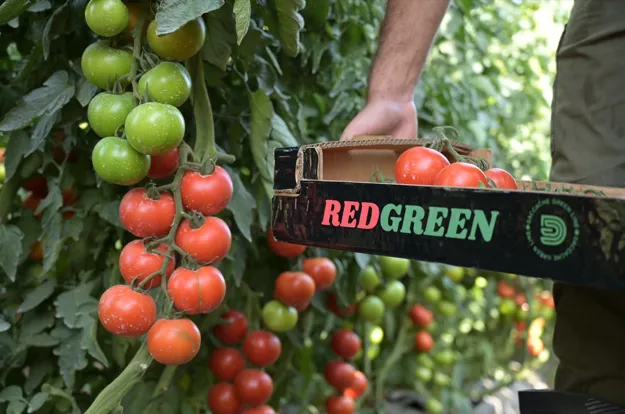
In the winter, the ground is blanketed in a meter-thick layer of snow. However, come summer and fall, lush crops of sun-ripened tomatoes emerge. And there is nothing tastier than a tomato that ripens on a plant whose roots are nourished in fertile, open soil and whose leaves sway gently on a breeze that blows in from the mountains. So says Antoine Daccache, whose plots on Mount Lebanon are 1,500 m above sea level.
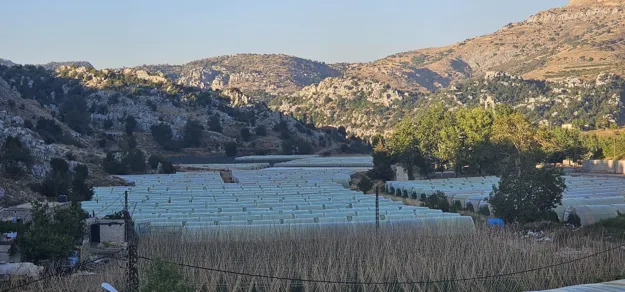
Tomato cultivation at 1500 meters in the mountains
Daccache Green Line (DGL), a family business, is a cultivation and trade company specializing in tomatoes supplemented by cucumbers and apples. "We start cultivating the land in April, and from mid-May to mid-June, we plant the tomato seedlings, slightly staggered over time, to then harvest cherry, cherry plum, vine, and beef tomatoes from mid-August to almost the end of November. We offer flexibility in production, with the knowledge and available land to cultivate various tomato varieties to meet customer demands and stand out as one of just three certified tomato growers in Lebanon, maintaining year-round certification," he begins.
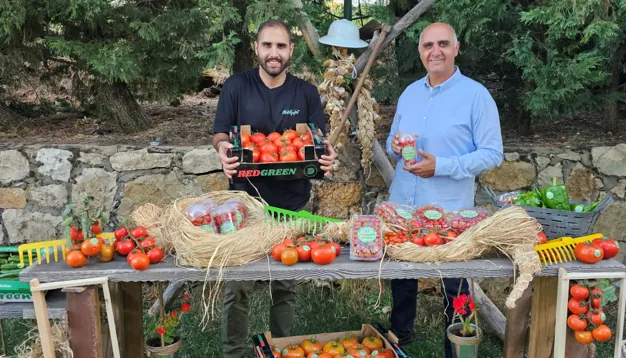
Antoine and his father show part of the delivery package: tomatoes, cucumbers, peppers, and hot peppers
Part of Mount Lebanon needs no greenhouses
The stable, dry, sunny weather in the growing and harvesting season and the high altitude mean we hardly have any disease and pest pressure, says Antoine. "Only the vast day/night temperature difference proves somewhat challenging, but that is fairly easy to solve with good cultivation practices and some preventative action. Generally, thanks to our exceptionally favorable weather conditions, we use very few plant protection products. Put it this way: we don't need greenhouses to protect crops from all kinds of biotic and abiotic pressures. And as mentioned, nothing beats the flavor of a sun-ripened tomato."
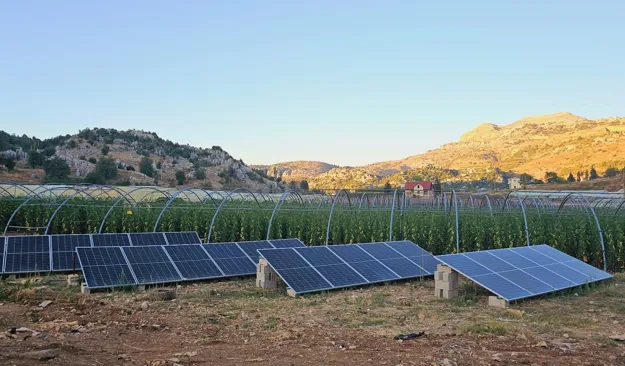
Solar panels next to the tomatoes
Climate change could be a good thing
Shade and insect nets are not a must, either. "The sun can, of course, be harsh here. So, to protect the fruit, we leave many leaves hanging on the plants. It does slow down harvesting somewhat, with tomatoes occasionally being missed. And though labor's cheap, the availability of good workers is coming under pressure, so we're looking forward to mechanizing certain cultivation operations, especially planting. Pruning, thinning, and harvesting, on the other hand, will remain manual work," says Antoine.
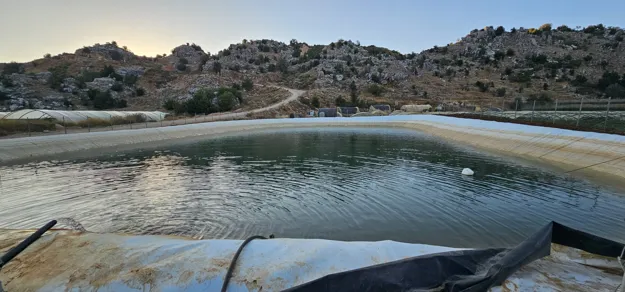
All rain and melt water is collected in a basin
"We may have to invest more in shade nets in the future because of climate change, though I believe that could eventually benefit us. If the summer lasts longer, our season does too. We currently cut the plants back after seven to eight bunches. In the future, we might manage to continue slightly longer."
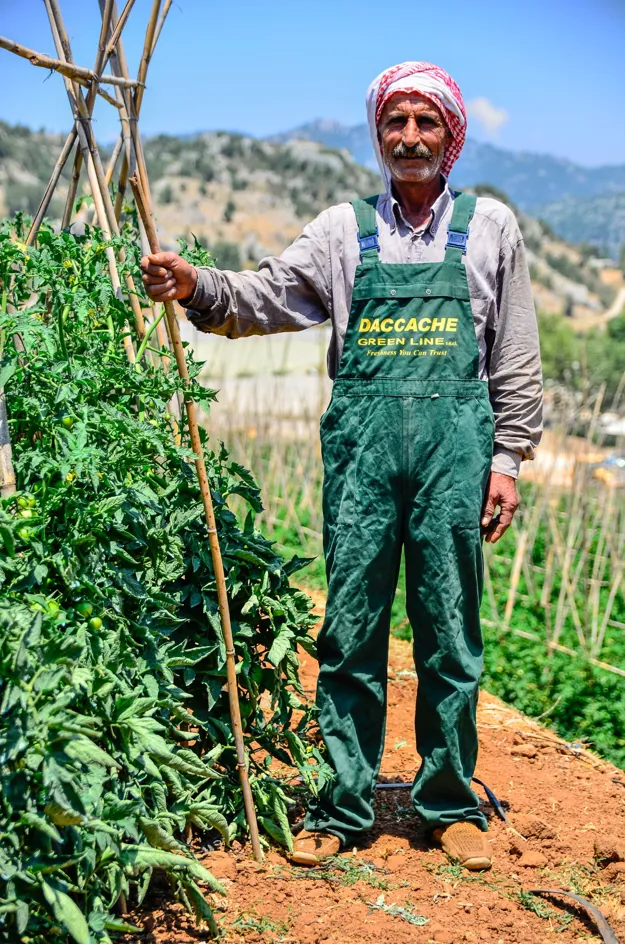
Some of the tomatoes are grown in the open air with bamboo sticks
No more tomatoes to Saudi Arabia
Daccache Green Line's ten hectares are spread over four plots on Mount Lebanon, where the rough terrain does not allow for large, uninterrupted plots of land. Yet, the company still manages to harvest 1,500 tons of tomatoes per season. Most are marketed locally, with Class I and Class II products destined for super and hypermarkets and the lowest quality sold at wholesale markets. Its packaging methods are adaptable to cater to specific customer preferences, ensuring flexibility in the product offerings.
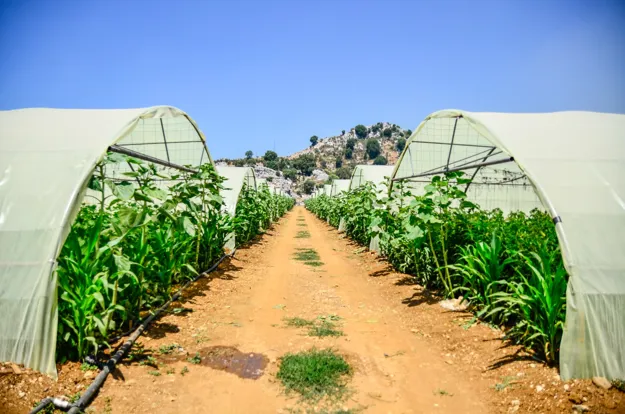
DGL harvests 1,500 tons of tomatoes annually
Some volumes are exported to the Gulf States, too, but since Saudi Arabia's 2021 ban on Lebanese fruit and vegetables, overseas sales have declined. DGL is thus turning its gaze toward the European market, where tomato supplies decrease somewhat in October and November.
Situated in Lebanon, the strategic geographic location of DGL provides access to both Gulf and European markets. The company operates within a unique export window during August, September, October, and November, a period when most neighboring countries are unable to produce, making it a prime exporter. "Drawing from our extensive experience, we have successfully engaged in exports and direct trade with retailers. Our track record includes collaborations with a wide array of customers, both within our local market and across Europe and the Middle East."
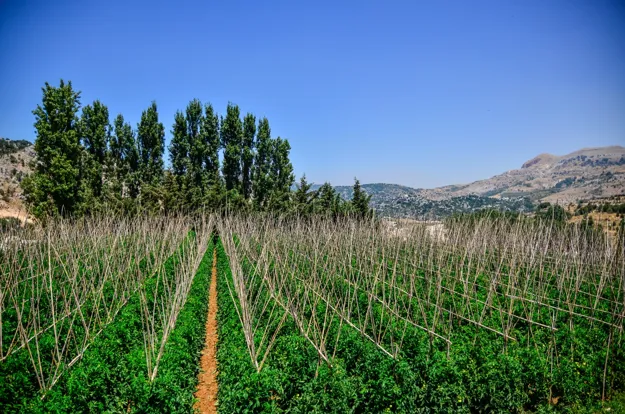
Specialties for the Gulf States and Europe
"We will focus on niche products - specialties and snack tomatoes - not vine tomatoes. Based on my research, I see opportunities for that segment in the UAE, too. There, 80% of tomatoes come from Iran and Jordan, and five percent from the Netherlands, Italy, and Spain. Yet, those three European countries represent 30% of the UAE's tomato market value. Because they only sell niche products there. We can do that too, and at a much lower cost, despite the war in Syria complicating our logistics to that market. That's our next goal. Maybe we'll find a buyer from the Middle East or Europe at the upcoming Fruit Attraction," Antoine says.
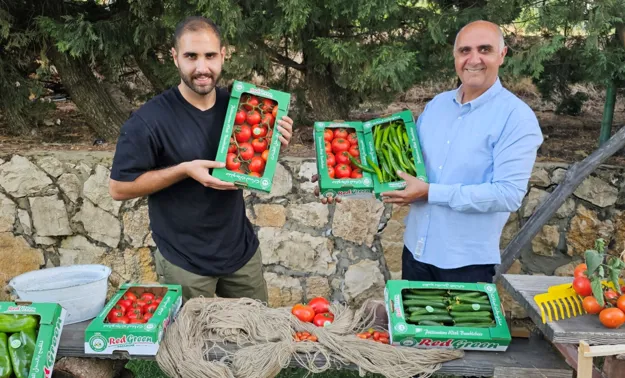
DGL focuses on exporting specialties to Europe
Supporting small-scale growers
Outside of its season, DGL buys tomatoes from growers in Lebanon's lower-lying areas to supply its clients year-round. "We ensure a consistent supply throughout the year, sourced from our own farms and collaborating with neighboring farmers. As a reference company, we do the marketing for an extensive network of growers, also investing in technical support and jointly purchasing the seeds to grow the same varieties in order to standardize production among our partner farmers. Most of the seeds come from renowned breeders through a seed importer, and we put plant propagation in the hands of specialized nurseries," Antoine explains.
Though similar to a cooperative model, it is not quite the same, the young grower points out. "We remain a profit-driven private company, but we offer plenty of support to small-scale growers at all stages of the growing, processing, and sales process. I dream of uniting all Mount Lebanon growers to ensure a steady supply of consistent quality for retail and export. That includes building a packing facility with a modern sorting line here in the mountains. Those plans are already in place," Antoine concludes with determination.
Daccache Green Line will be at the upcoming Fruit Attraction in Madrid in Hal 1, stand 1C10.
For more information:
Antoine Daccache
Daccache Green Line
Okaibeh, Keserwan (Libanon)
Te.l: +961 9448813
Mob.: +961 71575316
Email: [email protected]
